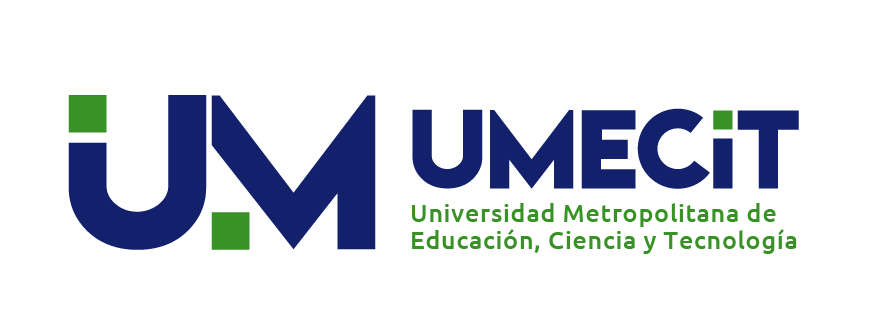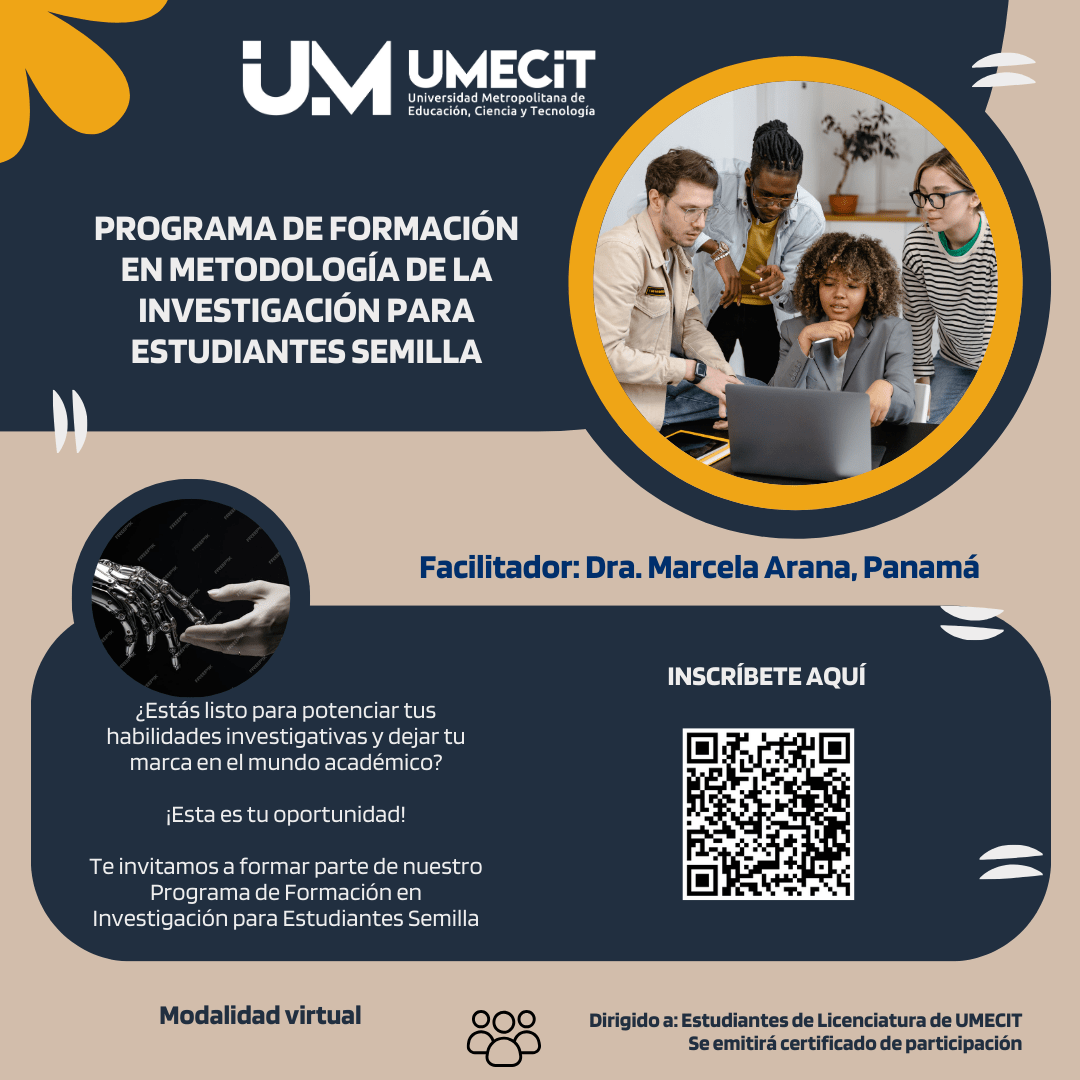Join the training program in Research Methodology for Semilla Students at UMECIT
Are you ready to boost your research skills and make your mark in academia? This is your chance! We invite you to be part of our Research Training Program for Semilla Students, where you will cultivate your passion for research and develop skills that will boost your professional career and enhance your graduation profile. Join a vibrant and passionate learning community, where every discovery is a step towards progress. Discover the power of research and be part of the change! Sign up now at the link:
Program Details:
Facilitator: Dr. Marcela Arana, Panama
Modality: Virtual
Addressed to: UMECIT Undergraduate Students
Certification: Certificate of participation will be issued
Relevance of the Program and Added Value:
Research, as a driver of progress and innovation, occupies a central place in the academic field. Recognizing its significance, at UMECIT University we are committed to cultivating a culture of research and academic excellence. In this sense, within the framework of the UMECIT Research Training Program, we are pleased to present our new RESEARCH METHODOLOGY TRAINING PROGRAM FOR SEED STUDENTS, designed specifically to strengthen the capabilities of our students, as guides and mentors in the development and operation of the research hotbeds of our study house.
Program Benefits:
Development of specific skills in research.
Institutional recognition as a commitment to academic excellence and the promotion of research. Privileged access to institutional resources and collaboration networks. Positive influence on the academic and professional development of colleagues. Continuous support and guidance from the team in charge.
MODULE 1: INTRODUCTION TO RESEARCH METHODOLOGY
Activity 1: Basic aspects of Research Methodology
Objective: The objective of this activity is to familiarize students with the fundamental concepts of research methodology, highlighting its relevance in the development of solid and significant research projects.
Date: Thursday, May 2, 2024
Time: 6 pm
Theoretical Description: The research methodology constitutes the conceptual and methodological framework on which any research project is based. In this introductory session, the main aspects of research methodology will be addressed in depth, starting with its definition and its importance in the generation of scientific knowledge. Different methodological approaches will be explored, such as quantitative, qualitative and mixed, analyzing the distinctive characteristics of each one and the situations in which they are most appropriate.
Additionally, the essential elements of a research design will be discussed, from the formulation of the research question to the selection of data collection and analysis methods. Special attention will be paid to the importance of coherence between the research question, the objectives of the study and the methods used, as well as the need to consider ethical aspects at all stages of the research process.
Activity 2: The Research Design
Objective: The purpose of this activity is to train students in the planning and design of a research project, providing them with the necessary tools to adequately structure their research work.
Date: Thursday, May 9, 2024
Time: 6 pm
Theoretical Description: The research design constitutes the plan or strategy that guides the execution of a research project. In this session, we will delve into the different types of research design, such as experimental, correlational, descriptive, among others. The distinctive characteristics of each will be examined, as well as their applications and limitations in the context of scientific research.
Likewise, the fundamental stages of a research design will be discussed, from the identification of the research problem and the review of existing literature to the definition of variables, the selection of the sample and the development of a detailed collection and analysis plan. of data. Practical examples of research projects with different designs will be presented, in order to illustrate how the theoretical concepts discussed are applied in practice.
MODULE 2: FIELD WORK
Activity 1: The data collection process in the research
Aim: The purpose of this activity is to provide students with the necessary tools to collect data effectively and ethically, guaranteeing its validity and reliability.
Date: Thursday, May 16, 2024
Time: 6 pm
Theoretical Description: Data collection constitutes a critical stage in the investigative process, since the quality and reliability of the results obtained depends on it. In this session, the different data collection methods and techniques will be discussed in detail, including surveys, interviews, observation, documentary analysis, among others. The advantages and limitations of each method will be discussed, as well as the ethical considerations that must be taken into account when collecting data, especially with regard to confidentiality, informed consent, and protection of participants. Practical exercises will be carried out so that students become familiar with the application of different data collection techniques and understand their relevance in the context of their research project.
Activity 2: Data Analysis
Objective: The objective of this activity is to introduce students to the most common data analysis techniques in research, providing them with the necessary tools to interpret and give meaning to the results obtained.
Date: Thursday, May 23, 2024
Time: 6 pm
Theoretical Description: Data analysis constitutes a crucial stage in the investigative process, in which the collected data are examined and processed in order to identify patterns, trends and significant relationships. In this session, different data analysis techniques will be explored, both quantitative and qualitative, including descriptive analysis, inferential analysis, content analysis, among others. The basic steps to perform a rigorous and systematic data analysis will be discussed, from the organization and cleaning of the data to the interpretation of the results obtained. Data analysis tools and software commonly used in research will be demonstrated, giving students the opportunity to become familiar with their operation and practical applications.
MODULE 3: INTERPRETATION AND PRESENTATION OF RESULTS IN A
INVESTIGATION
Activity 1: Socialization of Results
Objective: The purpose of this activity is to train students in the interpretation of research results and in the effective presentation of the findings obtained.
Date: Thursday, May 23, 2024
Time: 6 pm
Theoretical Description: The interpretation and presentation of results constitute a
crucial stage in the investigative process, in which the data obtained are analyzed and significant conclusions are drawn that respond to the research question posed. In this session, best practices for interpreting research results will be discussed in detail, emphasizing the relationship between the findings and existing literature, as well as the relevance of the results to the
field of study.
Different ways of presenting results, such as written reports, oral presentations and posters, will be explored, highlighting the key features of each and the situations in which they are most appropriate. Practical advice will be provided to communicate the results in a clear, concise and persuasive way, taking into account the intended audience and the objectives of the research.
Activity 2: Practical Application
Objective: The objective of this activity is to apply the knowledge acquired in a practical activity of research design and analysis, integrating the different aspects of the research process into a complete project.
Date: Thursday, May 30, 2024
Time: 6 pm
Theoretical Description: In this last session, students must search for articles by scientists published on the web, which clearly describe the research problem, the objectives, the question, the methodology used and the results obtained; In this last meeting, students will actively participate, demonstrating the learning acquired during each of the sessions. During the activity, feedback between groups will be facilitated and discussion about the challenges and lessons learned during the research process will be encouraged.
CLOSING SESSION: SOCIALIZATION OF RESEARCH PROPOSALS GENERATED
FROM THE SEEDGROUNDS
Date: Saturday, June 8, 2024 (In person at each headquarters) Time 9:00 am
BIBLIOGRAPHY:
1. Babbie, E. (2016). The practice of social research. Cengage Learning.
2. Creswell, J.W. (2014). Research design: Qualitative, quantitative, and mixed
methods approaches (4th ed.). Sage Publications.
3. Hernández, R., Fernández, C., & Baptista, P. (2014). Methodology of the
research (6th ed.). Mexico: McGraw-Hill Interamericana.
4. Fraenkel, JR, Wallen, NE, & Hyun, HH (2015). How to design and evaluate
research in education (9th ed.). McGraw-Hill Education.
5. Leedy, P.D., & Ormrod, J.E. (2019). Practical research: Planning and design
(12th ed.). Pearson.
6. Neuman, W. L. (2014). Social research methods: Qualitative and quantitative
approaches. Pearson.
7. Rodríguez, G., Gil, J., & García, E. (1999). Investigation methodology
qualitative. Malaga, Spain: Cistern.
Don't miss this unique opportunity to boost your academic career and contribute to the advancement of knowledge at our institution!


